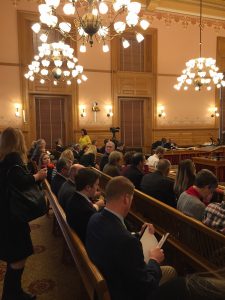METL: Stronger Together
 On Tuesday, January 17, representatives from chambers of commerce for Manhattan, Emporia, Topeka and Lawrence gathered at the historic Dillon House for the first ever METL: Stronger Together reception. These business groups have been discussing for some time the value of working together as a region. The reception was designed to bring together the 28 state legislators who represent that region and give them a sense of the influence they could have in the legislature if they coordinated their efforts and spoke with one voice. As many as 50 business leaders and chamber executives from these communities traveled to Topeka for the event and over half of the legislators were able to slip away from the Statehouse to chat with this very engaged group about how bright our collective future could be. Stay tuned as METL charts the course for subsequent activities. Thanks to the Dillon House for providing an unequaled venue for this gathering, directly across the street from the Statehouse. Thanks also to Aboud’s and Palace Liquor for making sure the guests were well-fed and refreshed.
On Tuesday, January 17, representatives from chambers of commerce for Manhattan, Emporia, Topeka and Lawrence gathered at the historic Dillon House for the first ever METL: Stronger Together reception. These business groups have been discussing for some time the value of working together as a region. The reception was designed to bring together the 28 state legislators who represent that region and give them a sense of the influence they could have in the legislature if they coordinated their efforts and spoke with one voice. As many as 50 business leaders and chamber executives from these communities traveled to Topeka for the event and over half of the legislators were able to slip away from the Statehouse to chat with this very engaged group about how bright our collective future could be. Stay tuned as METL charts the course for subsequent activities. Thanks to the Dillon House for providing an unequaled venue for this gathering, directly across the street from the Statehouse. Thanks also to Aboud’s and Palace Liquor for making sure the guests were well-fed and refreshed.
The Governor’s Plan
Legislators learned more this week about how Governor Brownback would like to balance the budget. They are solving two puzzles. The first is how to find the roughly $350 million the state needs to pay its bills until June 30 of this year. The second is how to construct a two-year budget that will balance from July 1, 2017 to June 30, 2019. The Governor proposes to borrow about $318 million from a state entity called the Pooled Money Investment Board, where hundreds of miscellaneous state funds are kept until the money in them needs to be spent. The state would agree to pay itself back over seven years. The average Kansan will be relieved to know members of the House Appropriations Committee seemed just as perplexed by the detailed explanation they received this week as, well, the average Kansan would have been. The state does occasionally borrow from itself as a way of managing cash flow (because bills come due throughout the year and many taxes flow in around April). The proposed 7-year mortgage against these idle funds is unprecedented, though, and it is definitely a one-shot proposition; there won’t be any way to take-out a second mortgage on those funds. Aside from confusion, some legislators also expressed disappointment that this is far from the sort of long-term structural fiscal reform their voters sent them to Topeka to enact. The state needs cash, though, and this plan would provide it. So this part of the Governor’s plan seems relatively easy to swallow.
The Governor has also suggested the state sell its right to receive close to $50 million each year from the tobacco settlement fund in exchange for roughly $500 million in cash now. Legislators have, thus far, not been receptive to this idea. Increased taxes on cigarettes and liquor are also on the table, as well as, returning passive income (like rents and royalties) to the tax rolls and cancelling a scheduled reduction in the lowest income tax rate Kansans pay from 2.7% to 2.6%. The Governor agrees that rate should stay at 2.7% for now.
While lawmakers, especially conservative ones, have very little desire to vote for tax increases, many of them appear to recognize that the state’s current budgetary shortfall may require some form of what is now euphemistically called “revenue enhancement.” If they are going to have to raise taxes, no one in the legislature, particularly House members who face their constituents again in just two years, is at all fond of the idea of voting more than once to do so. Most legislators favor a comprehensive approach; a major bill which has been very carefully put together, which solves the problem once and for all and which gathers all the painful decisions in one place where they can be dispatched with a single uncomfortable vote. (Just such a “Mega Bill” is said to be under construction as this legislative update went to press.) The problem is the state needs money now and it will take time to draw-up a comprehensive long-term solution. This tension between the need for immediate cash and the desire to really work this through and get it done right the first time creates one of the key dynamics this legislative session. The other key is still waiting restlessly across the street in the Judicial Center: the yet to be announced supreme court ruling on school finance.
LLC debate
 Last week, the House Taxation Committee heard testimony on HB 2023, the bill which would repeal the income tax exemption for pass-through business entities. As many as fifty people came to Topeka to make their case before the committee and they represented all sides of the issue. Some were small businesses testifying the small-business tax break had enabled them to grow their businesses. Others noted that, while they appreciated the special tax treatment which has been accorded businesses like theirs, they’ve always made hiring decisions based on whether their business needed the help; not on taxes. Besides, some of them said, the amount they’ve saved in taxes has never been enough to pay for even a single new full-time employee. The Governor’s Administration, for its part, contended the pass-through exemption has fulfilled its purpose of creating news businesses and jobs in Kansas, though, some of the legislators questioned aloud whether jobs numbers could legitimately be attributed to the 2012 tax law or are really the result of localized efforts and conditions, such as the huge, some might say Legendary, growth which has taken place recently in western Wyandotte County.
Last week, the House Taxation Committee heard testimony on HB 2023, the bill which would repeal the income tax exemption for pass-through business entities. As many as fifty people came to Topeka to make their case before the committee and they represented all sides of the issue. Some were small businesses testifying the small-business tax break had enabled them to grow their businesses. Others noted that, while they appreciated the special tax treatment which has been accorded businesses like theirs, they’ve always made hiring decisions based on whether their business needed the help; not on taxes. Besides, some of them said, the amount they’ve saved in taxes has never been enough to pay for even a single new full-time employee. The Governor’s Administration, for its part, contended the pass-through exemption has fulfilled its purpose of creating news businesses and jobs in Kansas, though, some of the legislators questioned aloud whether jobs numbers could legitimately be attributed to the 2012 tax law or are really the result of localized efforts and conditions, such as the huge, some might say Legendary, growth which has taken place recently in western Wyandotte County.
While the arguments for and against continuation of the pass-through exemption followed well-trodden ground, one comment in particular was distracting in its candor. Recently-appointed Secretary of Revenue, Sam Williams, kicked-off the long hearing by admitting to material flaws in the analysis his office had done of how much revenue would flow into the state’s budget if the exemption were repealed. People in the Statehouse call these kinds of analyses “Fiscal Notes.” The Department of Revenue’s initial Fiscal Note on HB 2023 suggested the bill would raise about $178.3 million. However, Secretary Williams confessed he had just been informed the Fiscal Note has some mistakes and he expects the actual number to be higher; probably over $200 million. While that is nowhere near enough to close the budget gap, legislators understandably need to have solid facts as they assess all of their unpleasant options. Williams pledged to work over the weekend to deliver a fresh accurate Fiscal Note this week.
To see past legislative updates, click here.
Our Most Recent Blogs
- 5 Things You’ll Miss if you aren’t at this Event: Greater Topeka Partnership Annual Meeting
- Amy Hough Sleep Consulting
- Non-traditional Meeting Spaces in Topeka & Shawnee County
- Modern Woodmen Fraternal Financial
- Anytime Fitness- West Topeka
[starbox id=Curtis]
